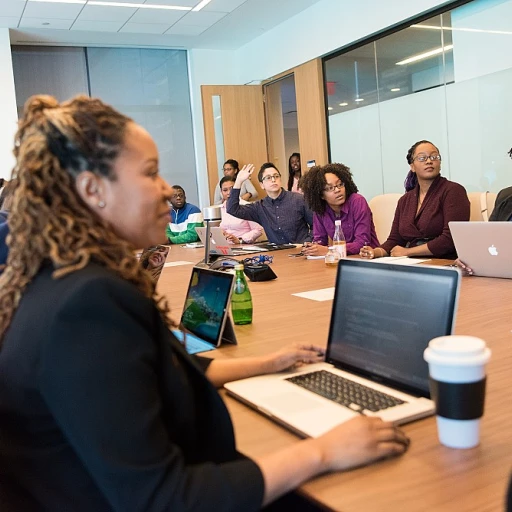
Understanding the Human Resource Management Generalist
The Multi-Faceted Role of HR Generalists
Human Resource Management Generalists wear many hats in an organization, making their role both challenging and rewarding. Unlike specialists who focus on specific areas like performance management or compensation benefits, generalists must have a broad range of skills. These allow them to handle diverse areas within human resources, from employee relations to benefits administration. But what exactly does an HR generalist do on a day-to-day basis?
Primarily, they act as business partners to managers, playing a crucial role in the development and implementation of HR policies. They're also responsible for ensuring compliance with laws and regulations, maintaining a healthy work environment, and offering training development opportunities. Obtaining a bachelor degree in HR or a related field is usually a starting point, while many HR generalists enhance their career with a generalist certificate.
Given their diverse responsibilities, HR generalists are integral in shaping the organization’s employer brand. They balance between employees and management, fostering a workplace culture that aligns with the company’s values and objectives. This role is instrumental in managing and communicating the benefits and perks of working at a particular organization, which plays a pivotal part in how potential and current employees perceive the company.
In the broader context of employer branding, HR generalists contribute significantly by leveraging their career path knowledge and skills honed through years of experience in human resources. Their unique position allows them to learn and adapt quickly to the rapidly changing work landscape, creating strategies that not only attract prospective employees but also retain and engage current ones.
For those looking to dive deeper into the transferable skills required to thrive in this position, understanding the modern candidate profile is a great way to start.
The Intersection of Employer Branding and HR Generalists
The Dynamic Role of HR Generalists in Strengthening Employer Brands
In today's business landscape, the importance of developing a strong employer brand cannot be overstated. A key element in accomplishing this goal is the effective integration of Human Resource Management Generalists into the employer branding strategy. These professionals, equipped with a diverse skill set, are pivotal in bridging the gap between employees and management.
HR Generalists have the unique ability to juggle multiple responsibilities, ranging from employee relations and performance management to training development and compensation benefits administration. Their broad expertise allows them to serve as a business partner to every facet of the organization, ensuring that the company's values and culture are consistently communicated and upheld.
A crucial aspect of employer branding is creating a positive work environment that attracts and retains top talent. This is where the role of the HR Generalist comes into play, as they work closely with resource management specialists to align employee experiences with the organization's brand. By focusing on employee career paths and providing support through resources like generalist certificates and continuous training programs, HR Generalists help shape a cohesive employer identity.
The intersection of employer branding and HR Generalists also highlights the need for ongoing resources management training and development. Generalists are in a position to leverage job opportunities and resources that cater to employee needs, such as compensations and benefits that reflect the current market trends.
For those seeking to enhance their employer branding initiatives, understanding the multifaceted role of HR Generalists is essential. Their comprehensive knowledge and ability to collaborate with specialists enable organizations to maintain competitive advantages in attracting skilled employees. Maintaining a focus on these dynamic professionals ensures that the organization's reputation as a desirable place to work is sustained.
For more insights into effectively integrating these roles into your strategy, explore enhancing job sourcing through employer branding.
Current Trends in Employer Branding
Emerging Patterns in Employer Branding
In the evolving landscape of employer branding, several trends are reshaping how organizations attract and retain talent. As businesses strive to create a compelling work environment, human resource management generalists play a pivotal role in integrating these trends into their strategies.
Personalization and Employee Experience
One of the most significant trends is the shift towards personalization in the employee experience. Companies are increasingly recognizing the importance of tailoring their approaches to meet the diverse needs of their workforce. This involves customizing training development programs, offering flexible work arrangements, and enhancing benefits administration to align with individual preferences. Human resources generalists are at the forefront, leveraging their skills to create personalized career paths and development opportunities for employees.
Emphasis on Diversity and Inclusion
Diversity and inclusion have become central to employer branding efforts. Organizations are focusing on building inclusive cultures that reflect a wide range of perspectives and backgrounds. This trend not only enhances the work environment but also strengthens employee relations and boosts performance management. HR generalists, with their comprehensive understanding of laws regulations and employee needs, are crucial in implementing effective diversity initiatives.
Leveraging Technology and Data
Technology continues to transform the way businesses approach employer branding. From utilizing data analytics to understand employee engagement to implementing AI-driven recruitment tools, technology is a key enabler. HR generalists must adapt to these changes, acquiring new skills and knowledge to effectively manage these tools. This technological shift also requires ongoing training and development to ensure that HR teams remain competitive and capable of meeting the demands of modern business environments.
Focus on Employer Value Proposition (EVP)
Crafting a strong Employer Value Proposition (EVP) is essential in attracting top talent. Organizations are investing in defining and communicating their unique value propositions to potential employees. This involves highlighting aspects such as career development opportunities, compensation benefits, and the overall work environment. HR generalists, acting as business partners, play a critical role in shaping and promoting the EVP to ensure it resonates with both current and prospective employees.
As these trends continue to evolve, the role of HR generalists in employer branding becomes increasingly vital. Their ability to bridge the gap between organizational goals and employee needs positions them as key players in shaping the future of work.
Challenges Faced by HR Generalists in Employer Branding
Obstacles in the Path of HR Generalists
Human Resource Management Generalists face a variety of challenges as they navigate the complex landscape of employer branding in today’s work environment. While HR generalists are equipped with skills that cover a broad spectrum of areas within human resources, there are specific obstacles they encounter in this vital role.- Balancing Diverse Skill Sets: HR generalists often juggle numerous responsibilities ranging from employee relations to training development and performance management. With the breadth of knowledge required, maintaining a strong employer brand can be daunting, particularly when compared to resources specialists who might focus specifically on branding strategies.
- Adapting to Technological Advancements: The rapid pace of technological evolution demands continuous learning and adaptation. HR generalists must embrace digital tools and platforms for recruitment and communication to stay relevant, while also ensuring that the human aspect isn’t lost in employer branding efforts.
- Navigating Laws and Regulations: Keeping abreast of ever-changing laws and regulations is critical. This impacts everything from compensation benefits to benefits administration, and failing to comply can harm the organization’s brand. HR generalists must ensure that compliance is seamlessly integrated into the employer branding strategy.
- Managing Diverse Workforce Needs: As businesses grow more global, the diversity of employees increases, bringing unique challenges. HR generalists must cater to varied career paths and work environments, which requires innovative strategies to address the needs of a diverse employee base.
- Competing with Resources Specialists: With an increasing number of resource specialists in the field, HR generalists may find themselves competing for relevance. This necessitates a proactive approach to career development, potentially pursuing a generalist certificate or aligning closely with a business partner to sharpen their employer branding acumen.
- Resource Management and Communication: Efficient resource management is crucial in maximizing the impact of employer branding. Misallocation of resources, whether human or financial, can lead to ineffective branding strategies. Additionally, clear communication between generalists and managers, employees, and other stakeholders within the organization is essential for successful employer branding initiatives.
Strategies for Effective Employer Branding
Implementing Effective Employer Branding Strategies
In today’s competitive job market, organizations must establish a compelling employer brand that attracts and retains top talent. As a resource generalist, understanding the strategies to enhance an organization's standing is crucial for overall business success. One of the primary responsibilities is to foster an appealing work environment that aligns with the values and career aspirations of potential and current employees. This involves collaborating closely with resource specialists and leveraging skills across the HR spectrum, including employee relations and performance management. Effective communication of the organization's values is essential in this task. Career Development Opportunities Human resource management should prioritize training development programs that provide growth avenues for both new hires and long-term employees. A generalist must identify training needs and coordinate programs, such as a generalist certificate or specialized courses in benefits administration, to help employees progress in their career paths. Providing transparent career opportunities can significantly elevate employee satisfaction and retention. Utilizing Technology for Branding Technology plays a significant role in modern employer branding. HR generalists should be proficient in using digital tools for recruitment and employee engagement. Technology can aid in compiling employee feedback, which is invaluable for shaping branding strategies that reflect employees' views and needs. Resources management tools can help track and measure the effectiveness of these strategies, ensuring continuous improvement. Aligning Strategies with Organizational Goals Understanding the organization's goals and how they align with employer branding is essential. HR generalists act as a bridge between strategy and practice, ensuring the brand resonates authentically within the company’s culture. Collaboration with management and being a proactive business partner ensures branding goals are consistent with the broader organizational objectives. Navigating these strategies effectively will not only enhance the organization's reputation but also strengthen its position as an employer of choice—a topic further discussed when considering the intersection of HR generalists and employer branding.The Future of Employer Branding and HR Generalists
Emerging Roles and Responsibilities
As the landscape of employer branding continues to evolve, the role of human resource management generalists is set to expand. These professionals will increasingly act as strategic business partners, bridging the gap between management and employees. Their skills in employee relations and performance management will be crucial in fostering a positive work environment that aligns with the organization's brand values.
Integration of Technology and Human Touch
Technology will play a pivotal role in shaping the future of employer branding. HR generalists will need to leverage digital tools for training development and benefits administration while maintaining the human touch that is essential for effective employee engagement. This balance will be key in ensuring that the organization's brand is perceived positively both internally and externally.
Continuous Learning and Development
To stay relevant, HR generalists must commit to continuous learning. Pursuing a generalist certificate or a bachelor degree in human resources can enhance their skills and career path. Additionally, staying updated with laws regulations and compensation benefits trends will be essential for effective resource management.
Collaboration with Specialists
The future will see more collaboration between generalists and resources specialists. This partnership will enable organizations to harness the strengths of both roles, leading to more comprehensive strategies in employer branding. By working together, they can address complex challenges and drive organizational growth.













